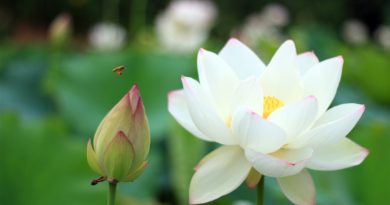Division Iii –– Khandhaka Book 23 –– Diṭṭhi Saṃyutta Chapter 1 –– Sotāpatti (paṭhamo) Vagga
Sutta Pitaka
Saṃyutta Nikāya
Division III –– Khandhaka
Book 23 –– Diṭṭhi Saṃyutta
Chapter 1 –– Sotāpatti (Paṭhamo) Vagga
Namo tassa bhagavato arahato sammā sambudhassa
23. 1. 1.
(1) Vātaṃ –– Observance
1. I heard thus. At one time the Blessed One was living in the monastery offered by Anāthapiṇḍika in Jeta’s grove in Sāvatthi.
2. The Blessed One addressed the monks from there: “Monks, conscious of what, and grasping and settling in what, arise the view, ‘Winds do not blow, rivers do not flow, mothers do not give birth, the moon and sun do not rise and set, and like a pillar everything stands still’?”
3. “Venerable sir, the Blessed One is the leader for the Teaching, hearing it from the Blessed One the monks will bear it in mind.”
“Then monks, listen carefully, I will tell you.
4. “Monks, conscious of matter, grasping and settling in it, arise the view ‘winds …re … stands still.’
5-7. “Monks, conscious of feelings, perceptions, and intentions, grasping and settling in them arise the view, ‘Winds … re stands still.’
8. “Monks, consciously grasping and settling in consciousness arise the view, ‘Winds … re … stands still.’
9. “Monks, is matter permanent or impermanent?”
“Venerable sir, it is impermanent.”
“That which is impermanent, is it unpleasant or pleasant?”
“Venerable sir, it is unpleasant.”
“Adhering that it is impermanent, unpleasant, changing, would this view arise, ‘Winds … re … stands still’?”
“That is not so, venerable sir.”
10-12. “Are feelings, perceptions, and intentions permanent or impermanent?”
“Venerable sir, they are impermanent.”
“Those which are impermanent are they unpleasant or pleasant?”
“Venerable sir, they are unpleasant.”
“Adhering they are impermanent, unpleasant, changing would the view arise, ‘Winds … re … stands still’?”
“That is not so, venerable sir.”
13. Monks, is consciousness permanent or impermanent?”
“Venerable sir, it is impermanent.”
“That which is impermanent, is it unpleasant or pleasant?”
“Venerable sir, it is unpleasant.”
“Adhering it is impermanent, unpleasant, changing would the view arise, ‘Winds … re … stands still’?”
“That is not so, venerable sir.”
14. Monks, are whatever seen, heard, sensed, cognized, achieved, and pursued by the mind permanent or impermanent?”
“Venerable sir, they are impermanent.”
“Those which are impermanent, are they unpleasant or pleasant?”
“Venerable sir, they are unpleasant.”
“Adhering they are impermanent, unpleasant, changing, would the view arise, ‘Winds … re … stands still’?”
“That is not so, venerable sir.”
15. “Monks, when the learned noble disciple has dispelled doubts in these six instances, his doubts about unpleasantness, its arising, ceasing, and the method for the cessation of unpleasantness too are dispelled. Monks, to this is said the noble disciple has entered the stream of the Teaching. He would not fall from there and his single aim would be enlightenment.”
23. 1. 2.
(2) Etaṃ mama –– This is Mine
1. I heard thus. At one time the Blessed One was living in the monastery offered by Anāthapiṇḍika in Jeta’s grove in Sāvatthi.
2. The Blessed One addressed the monks from there: “Monks, conscious of what, and grasping and settling in what, arises the view, ‘This is mine, I am here, and this is my self.’?
3. “Venerable sir, the Blessed One is the leader for the Teaching, hearing it from the Blessed One the monks will bear it in mind.”
“Then monks, listen carefully, I will tell you.
4. Monks, conscious of matter, grasping and settling in matter, arise the view, ‘This is mine. I am here, and this is my self.’
5-7. “Monks, conscious of feelings, perceptions, and intentions, grasping and settling in them arise the view, ‘This is mine, I am here, and this is my self.’
8. “Monks, grasping and settling in consciousness arises the view, ‘This is mine, I am here, and this is my self.’
9. “Monks, is matter permanent or impermanent?”
“Venerable sir, it is impermanent.”
“That which is impermanent, is it unpleasant or pleasant?”
“Venerable sir, it is unpleasant.”
“Adhering that it is impermanent, unpleasant, changing, would the view arise, ‘This is mine, I am here, and this is my This
“That is not so, venerable sir.”
10-12. “Are feelings, perceptions, and intentions permanent or impermanent?”
“Venerable sir, they are impermanent.”
“Those which are impermanent are they unpleasant or pleasant?”
“Venerable sir, they are unpleasant.”
“Adhering they are impermanent, unpleasant, changing would the view arise, ‘This is mine, I am here, and this is my self.’?”
“That is not so, venerable sir.”
13. Monks, is consciousness permanent or impermanent?”
“Venerable sir, it is impermanent.”
“That which is impermanent, is it unpleasant or pleasant?”
“Venerable sir, it is unpleasant.”
“Adhering it is impermanent, unpleasant and changing would the view arise, ‘This is mine. I am here and this is my self’?”
“That is not so, venerable sir.”
14. Monks, are whatever seen, heard, sensed, cognized, achieved, and pursued by the mind permanent or impermanent?”
“Venerable sir, they are impermanent.”
“Those which are impermanent are they unpleasant or pleasant?”
“Venerable sir, they are unpleasant.”
“Adhering they are impermanent, unpleasant, changing would the view arise, ‘This is mine, I am here, and this is my self’?”.
“That is not so, venerable sir.”
15. “Monks, when the learned noble disciple has dispelled doubts in these six instances, his doubts about unpleasantness, its arising, ceasing, and the method for the ceasing of unpleasantness too are dispelled. Monks, to this is said the noble disciple has entered the stream of the Teaching. He would not fall from there and his single aim would be enlightenment.”
23. 1. 3.
(3) So Atta –– This is Self
1. I heard thus. At one time the Blessed One was living in the monastery offered by Anāthapiṇḍika in Jeta’s grove in Sāvatthi.
2. The Blessed One addressed the monks from there: “Monks, conscious of what, grasping and settling in what, arises the view, ‘This is self. This is the world. After death I will be permanent, everlasting, and will not change’?”
3. “Venerable sir, the Blessed One is the leader for the Teaching, hearing it from the Blessed One the monks will bear it in mind.”
“Then monks, listen carefully, I will tell you.
4. “Monks, conscious of matter, grasping and settling in it, arises the view, ‘This is self. This is the world. After death I will be permanent, everlasting, will not change.’
5-7. “Monks, conscious of feelings, perceptions, and intentions, grasping and settling in them arises the view, ‘This is self … re … will not change.’
8. “Monks, grasping and settling in consciousness arises the view, ‘This is self … re … will not change.’
9. “Monks, is matter permanent or impermanent?”
“Venerable sir, it is impermanent.”
“That which is impermanent, is it unpleasant or pleasant?”
“Venerable sir, it is unpleasant.”
“Adhering that it is impermanent, unpleasant, changing, would this view arise, ‘This is self … re … will not change’?”
“That is not so, venerable sir.”
10-12. “Are feelings, perceptions, and intentions permanent or impermanent?”
“Venerable sir, they are impermanent.”
“Those which are impermanent are they unpleasant or pleasant?”
“Venerable sir, they are unpleasant.”
“Adhering they are impermanent, unpleasant, changing would the view arise, ‘This is self … re … will not change’?”
“That is not so, venerable sir.”
13. Monks, is consciousness permanent or impermanent?”
“Venerable sir, it is impermanent.”
“That which is impermanent, is it unpleasant or pleasant?”
“Venerable sir, it is unpleasant.”
“Adhering it is impermanent, unpleasant, changing would the view arise, ‘This is self … re … will not change’?”
“That is not so, venerable sir.”
14. Monks, are whatever seen, heard, sensed, cognized, achieved, and pursued by the mind permanent or impermanent?”
“Venerable sir, they are impermanent.”
“Those which are impermanent, are they unpleasant or pleasant?”
“Venerable sir, they are unpleasant.”
“Adhering they are impermanent, unpleasant, changing would the view arise, ‘This is self. This is the world. After death I will be permanent, everlasting, will not change’?”.
“That is not so, venerable sir.”
15. “Monks, when the learned noble disciple has dispelled doubts in these six instances, his doubts about unpleasantness, its arising, ceasing, and the method for the ceasing of unpleasantness too are dispelled. Monks, to this is said the noble disciple has entered the stream of the Teaching. He would not fall from there and his single aim would be enlightenment.”
23. 1. 4.
(4) No ca me siya –– Not to Me
1. I heard thus. At one time the Blessed One was living in the monastery offered by Anāthapiṇḍika in Jeta’s grove in Sāvatthi.
2. The Blessed One addressed the monks from there: “Monks, conscious of what, grasping and settling in what, arises the view, ‘I was not, I am not, I will not be, I will have nothing’?”
3. “Venerable sir, the Blessed One is the leader for the Teaching, hearing it from the Blessed One the monks will bear it in mind.”
“Then monks, listen carefully, I will tell you.
4. “Monks, conscious of matter, grasping and settling in matter, arises the view, ‘I was not … re … nothing’.
5-7. “Monks, conscious of feelings, perceptions, and intentions, grasping and settling in them arises the view, ‘I was not … re … nothing’.
8. “Monks, mindfully grasping and settling in consciousness arises the view, ‘I was not … re … nothing’.
9. “Monks, is matter permanent or impermanent?”
“Venerable sir, it is impermanent.”
“That which is impermanent, is it unpleasant or pleasant?”
“Venerable sir, it is unpleasant.”
“Adhering that it is impermanent, unpleasant, changing, would the view arise, ‘I was not … re … nothing’?”
“That is not so, venerable sir.”
10-12. “Are feelings, perceptions, and intentions permanent or impermanent?”
“Venerable sir, they are impermanent.”
“Those which are impermanent are they unpleasant or pleasant?”
“Venerable sir, they are unpleasant.”
“Adhering they are impermanent, unpleasant, changing would the view arise, ‘I was not … re … nothing’?”
“That is not so, venerable sir.”
13. Monks, is consciousness permanent or impermanent?”
“Venerable sir, it is impermanent.”
“That which is impermanent, is it unpleasant or pleasant?”
“Venerable sir, it is unpleasant.”
“Adhering that it is impermanent, unpleasant, changing would the view arise, ‘I was not, I am not, I will not be, I will have nothing’?”
“That is not so, venerable sir.”
14. Monks, are whatever seen, heard, sensed, cognized, achieved and pursued by the mind permanent or impermanent?”
“Venerable sir, they are impermanent.”
“Those which are impermanent, are they unpleasant or pleasant?”
“Venerable sir, they are unpleasant.”
“Adhering they are impermanent, unpleasant, changing would the view arise, ‘I was not … re … nothing’?”.
“That is not so, venerable sir.”
15. “Monks, when the learned noble disciple has dispelled doubts in these six instances, his doubts about unpleasantness, its arising, ceasing, and the method for the ceasing of unpleasantness too are dispelled. Monks, to this is said the noble disciple has entered the stream of the Teaching. He would not fall from there and his single aim would be enlightenment.”
23. 1. 5.
(5) Natthi –– Nothing
1. I heard thus. At one time the Blessed One was living in the monastery offered by Anāthapiṇḍika in Jeta’s grove in Sāvatthi.
2. The Blessed One addressed the monks from there: “Monks, conscious of what, grasping and settling in what, arise the view, ‘There are no results for giving gifts, for sacrifices, for offerings, for good and evil actions. There is no this world, no rebirth, no mother, no father, no spontaneously arisen beings. In this world there are no recluses and brahmins who have attained the highest good, have fallen to the right method, have realized by themselves and declare this world and the next. And this person of the four primary elements, when dead the earth element returns to earth, the water element to water, the fire element to fire, the space element to space, the mental elements ascend the sky. Five people carry the dead as far as the shown altar. The grey bones will be the remains of the sacrifice. As for the words, “the giver will be rewarded by his offerings,” are the empty words of the foolish. The wise and the foolish break up and get destroyed after death.’?”
3. “Venerable sir, the Blessed One is the leader for the Teaching, hearing it from the Blessed One the monks will bear it in mind.”
“Then monks, listen carefully, I will tell you.
4. “Monks, conscious of matter, grasping and settling in matter, arise the view, ‘There are no … re … destroyed after death’.
5-7. “Monks, conscious of feelings, perceptions, and intentions, grasping and settling in them arise the view, ‘There are no … re … destroyed after death’.
8. “Monks, mindfully grasping and settling in consciousness arises the view, ‘There are no results for giving gifts, for sacrifices, for offerings, for good and evil actions. ‘There are no … re … destroyed after death’.
9. “Monks, is matter permanent or impermanent?”
“Venerable sir, it is impermanent.”
“That which is impermanent, is it unpleasant or pleasant?”
“Venerable sir, it is unpleasant.”
“Adhering that it is impermanent, unpleasant, changing, would the view arise, ‘There are no … re … destroyed after death’?”
“That is not so, venerable sir.”
10-12. “Are feelings, perceptions, and intentions permanent or impermanent?”
“Venerable sir, they are impermanent.”
“Those which are impermanent are they unpleasant or pleasant?”
“Venerable sir, they are unpleasant.”
“Adhering they are impermanent, unpleasant, changing would the view arise, ‘There are no … re … destroyed after death’?”
“That is not so, venerable sir.”
13. Monks, is consciousness permanent or impermanent?”
“Venerable sir, it is impermanent.”
“That which is impermanent, is it unpleasant or pleasant?”
“Venerable sir, it is unpleasant.”
“Adhering that it is impermanent, unpleasant, changing would the view arise, ‘There are no … re … destroyed after death’?”
“That is not so, venerable sir.”
14. Monks, are whatever seen, heard, sensed, cognized, achieved and pursued by the mind permanent or impermanent?”
“Venerable sir, they are impermanent.”
“Those which are impermanent, are they unpleasant or pleasant?”
“Venerable sir, they are unpleasant.”
“Adhering they are impermanent, unpleasant, changing would the view arise, ‘There are no … re … destroyed after death’.
“That is not so, venerable sir.”
15. “Monks, when the learned noble disciple has dispelled doubts in these six instances, his doubts about unpleasantness, its arising, ceasing, and the method for the ceasing of unpleasantness too are dispelled. Monks, to this is said the noble disciple has entered the stream of the Teaching. He would not fall from there and his single aim would be enlightenment.”
23. 1. 6.
(6) Karoto –– The Doer
1. I heard thus. At one time the Blessed One was living in the monastery offered by Anāthapiṇḍika in Jeta’s grove in Sāvatthi.
2. The Blessed One addressed the monks from there: “Monks, conscious of what, grasping and settling in what, arises the view, ‘There is no doer and the done, destroyer and destroyed, assassin and assassinated, grief and bringer of grief, no trouble and no one causing trouble, no fright and causer of fright, no destroyer of living things, no taker of the not given, no house breaker, no plunderer, no one keeping a prison, no one waiting in ambush, no one going to others’ wives and telling lies. The doer does no evil. Someone killing all living things on this earth, threshing them into a harvest of meat with a wheel with butchers’ knives fixed to the circumference, on account of it does no evil and reaps no evil. Someone going along the southern bank of river Ganges destroying, slaughtering, causing to slaughter, burning and causing to burn does no evil and evil does not come to him on account of it. Someone going along the northern bank of river Ganges giving gifts and making others give gifts, making offerings and causing others to make offerings, by that does no good and merit does not accrue to him on account of that. Giving gifts taming the self and becoming truthful are not good actions that accrue merit’?”
3. “Venerable sir, the Blessed One is the leader for the Teaching, hearing it from the Blessed One the monks will bear it in mind.”
“Then monks, listen carefully, I will tell you.
4. “Monks, conscious of matter, grasping and settling in matter, arises the view, ‘There is no doer … re … accrue merit’.
5-7. “Monks, conscious of feelings, perceptions, and intentions, grasping and settling in them arises the view, ‘There is no doer … re … accrue merit’.
8. “Monks, mindfully grasping and settling in consciousness arises the view, ‘There is no doer and the done, destroyer and destroyed, assassin and assassinated, grief a‘There is no doer … re … accrue merit’.
9. “Monks, is matter permanent or impermanent?”
“Venerable sir, it is impermanent.”
“That which is impermanent, is it unpleasant or pleasant?”
“Venerable sir, it is unpleasant.”
“Adhering that it is impermanent, unpleasant, changing, would the view arise, ‘There is no doer … re … accrue merit’?”
“That is not so, venerable sir.”
10-12. Are feelings, perceptions, and intentions permanent or impermanent?”
“Venerable sir, they are impermanent.”
“Those which are impermanent are they unpleasant or pleasant?”
“Venerable sir, they are unpleasant.”
“Adhering they are impermanent, unpleasant, changing would the view arise, ‘There is no doer … re … accrue merit’?”
“That is not so, venerable sir.”
13. Monks, is consciousness permanent or impermanent?”
“Venerable sir, it is impermanent.”
“That which is impermanent, is it unpleasant or pleasant?”
“Venerable sir, it is unpleasant.”
“Adhering that it is impermanent, unpleasant, changing would the view arise, ‘There is no doer … re … accrue merit’?”
“That is not so, venerable sir.”
14. Monks, are whatever seen, heard, sensed, cognized, achieved and pursued by the mind permanent or impermanent?”
“Venerable sir, they are impermanent.”
“Those which are impermanent, are they unpleasant or pleasant?”
“Venerable sir, they are unpleasant.”
“Adhering they are impermanent, unpleasant, changing would the view arise, ‘There is no doer … re … accrue merit’?”
“That is not so, venerable sir.”
15. “Monks, when the learned noble disciple has dispelled doubts in these six instances, his doubts about unpleasantness, its arising, ceasing, and the method for the ceasing of unpleasantness too are dispelled. Monks, to this is said the noble disciple has entered the stream of the Teaching. He would not fall from there and his single aim would be enlightenment.”
23. 1. 7.
(7) Hetu –– Reasons
1. I heard thus. At one time the Blessed One was living in the monastery offered by Anāthapiṇḍika in Jeta’s grove in Sāvatthi.
2. The Blessed One addressed the monks from there: “Monks, conscious of what, grasping and settling in what, arise the view, ‘There is no cause and reason for the defilement of beings. Beings are defiled without a reason. And without cause and reason beings are purified. There is no power, effort, manly stability, and manly achievement. All beings, living things, the born lively things are carried along to maturity together and experience pleasantness and unpleasantness in the six spheres of contact without help, power, or effort.”
3. “Venerable sir, the Blessed One is the leader for the Teaching, hearing it from the Blessed One the monks will bear it in mind.”
“Then monks, listen carefully, I will tell you.
4. “Monks, conscious of matter, grasping and settling in matter, arises the view, ‘There is no cause … re … power or effort’.
5-7. “Monks, conscious of feelings, perceptions, and intentions, grasping and settling in them arise the view, ‘There is no cause … re … power or effort’.
8. “Monks, mindfully grasping and settling in consciousness arises the view, ‘There is no cause … re … power or effort’.
9. “Monks, is matter permanent or impermanent?”
“Venerable sir, it is impermanent.”
“That which is impermanent, is it unpleasant or pleasant?”
“Venerable sir, it is unpleasant.”
“Adhering that it is impermanent, unpleasant, changing, would the view arise, ‘There is no cause … re … power or effort’?”
“That is not so, venerable sir.”
10-12. “Are feelings, perceptions, and intentions permanent or impermanent?”
“Venerable sir, they are impermanent.”
“Those which are impermanent are they unpleasant or pleasant?”
“Venerable sir, they are unpleasant.”
“Adhering they are impermanent, unpleasant, changing would the view arise, ‘There is no cause … re … power or effort’?”
“That is not so, venerable sir.”
13. Monks, is consciousness permanent or impermanent?”
“Venerable sir, it is impermanent.”
“That which is impermanent, is it unpleasant or pleasant?”
“Venerable sir, it is unpleasant.”
“Adhering that it is impermanent, unpleasant, changing would the view arise, ‘There is no cause … re … power or effort’?”
“That is not so, venerable sir.”
14. Monks, are whatever seen, heard, sensed, cognized, achieved and pursued by the mind permanent or impermanent?”
“Venerable sir, they are impermanent.”
“Those which are impermanent, are they unpleasant or pleasant?”
“Venerable sir, they are unpleasant.”
“Adhering they are impermanent, unpleasant, changing would the view arise, ‘There is no cause … re … power or effort’?”
“That is not so, venerable sir.”
15. “Monks, when the learned noble disciple has dispelled doubts in these six instances, his doubts about unpleasantness, its arising, ceasing, and the method for the ceasing of unpleasantness too are dispelled. Monks, to this is said the noble disciple has entered the stream of the Teaching. He would not fall from there and his single aim would be enlightenment.”
23. 1. 8.
(8) [Mahā] Diṭṭthena –– With the Worst View
1. I heard thus. At one time the Blessed One was living in the monastery offered by Anāthapiṇḍika in Jeta’s grove in Sāvatthi.
2. The Blessed One addressed the monks from there: “Monks, conscious of what, grasping and settling in what, arise the view, ‘These seven are the bodies which are brought about by natural means, not created by some creator, sterile, and not the result of cause; they stand like pillars, unmoved, not suitable enough to disturb the pleasantness and unpleasantness of each other’?
3. “ ‘What seven? They are the bodies of earth, water, fire, air, pleasantness, unpleasantness, and life. These seven are the bodies which are brought about by natural means, not created by some creator, sterile and not the result of causes, they stand like pillars, unmoved, not suitable enough to disturb the pleasantness or unpleasantness or pleasant and unpleasant nature of each other.
4. “ ‘If someone were to cut the head with a sharp weapon, by that no life was destroyed. The weapon entered through a slit putting apart the seven bodies.
5. “ ‘There are fourteen hundred thousand and sixty-six hundred important births to go through in existences with five hundred actions, five actions, three actions, one action, and half an action following eight methods twice, for sixteen forward world cycles, born in the six mental faculties, going through the eight stages of the life of a prophet. Born four thousand, nine hundred times in each of the following, living a peculiar life, living the lives of mendicants and as venomous snakes. A hundred times with mental faculties, three thousand times gone astray, thirty-six times in space, in seven perceptive wombs, in seven non-perceptive wombs, in seven wombs without ties, seven times in heaven, seven times as humans, seven times as demons, seven times with perception, seven times as a block, experiencing seven hundred downfalls and seven hundred and seven visions throughout eighty small and large world cycles, born as hundred thousands of fools and wise they make an end of unpleasantness.
6. “ ‘Here it is not possible to get maturity for immature actions or feel and finish off the mature actions by virtues, observances, austerities, or leading a holy life. For the limited measured pleasant and unpleasant feelings in existences there is no decrease or increase, no excellence or inferiority.
7. “ ‘Like one thrown into a ball of thread, would have to find his way out, in the same manner the fools and the wise have to go through pleasantness and unpleasantness and find their way out’?
8. “Venerable sir, the Blessed One is the leader for the Teaching, hearing it from the Blessed One the monks will bear it in mind.”
“Then monks, listen carefully, I will tell you.
9. “Monks, conscious of matter, grasping and settling in matter, arises the view, ‘These seven are the bodies … re … find their way out’.
10-16. Monks, conscious of feelings, grasping and settling in feelings, arises the view, ‘‘These seven are the bodies … re … find their way out’.
17-22. Monks, conscious of perceptions, grasping and settling in perceptions, arises the view, ‘These seven are the bodies … re … find their way out’.
23-28. Monks, conscious of intentions, grasping and settling in intentions, arises the view, ‘These seven are the bodies … re … find their way out’.
29-34. Monks, with consciousness, grasping and settling in consciousness, arises the view, ‘These seven are the bodies … re … find their way out’.
35-40. Monks, are matter feelings, perceptions intentions and consciousness permanent or impermanent?”
“Venerable sir, they are impermanent.”
“Those which are impermanent, are they unpleasant or pleasant?”
“Venerable sir, they are unpleasant.”
“Adhering that they are impermanent, unpleasant, changing, would the view arise, ‘These seven are the bodies … re … find their way out’?”
41-46. Monks, are whatever seen, heard, sensed, cognized, achieved and pursued by the mind permanent or impermanent?”
“Venerable sir, they are impermanent.”
“Those which are impermanent, are they unpleasant or pleasant?”
“Venerable sir, they are unpleasant.”
“Adhering they are impermanent, unpleasant, changing would the view arise, ‘These seven are the bodies … re … find their way out’?”.
“That is not so, venerable sir.”
47. “Monks, when the learned noble disciple has dispelled doubts in these six instances, his doubts about unpleasantness, its arising, ceasing, and the method for the ceasing of unpleasantness too are dispelled. Monks, to this is said the noble disciple has entered the stream of the Teaching. He would not fall from there and his single aim would be enlightenment.”
23. 1. 9.
(9) Sassato Loko –– The World is Eternal
1. I heard thus. At one time the Blessed One was living in the monastery offered by Anāthapiṇḍika in Jeta’s grove in Sāvatthi.
2. The Blessed One addressed the monks from there: “Monks, conscious of what, grasping and settling in what, arise the view, ‘the world is eternal’?”
3. “Venerable sir, the Blessed One is the leader for the Teaching, hearing it from the Blessed One the monks will bear it in mind.”
“Then monks, listen carefully, I will tell you.
4. “Monks, conscious of matter, grasping and settling in matter, arise the view, ‘the world is eternal’.
5-8. “Monks, conscious of feelings, perceptions, intentions, and consciousness, grasping and settling in them arise the view, ‘the world is eternal’ .
9. “Monks, is matter permanent or impermanent?”
“Venerable sir, it is impermanent.”
“That which is impermanent, is it unpleasant or pleasant?”
“Venerable sir, it is unpleasant.”
“Adhering that it is impermanent, unpleasant, changing, would the view arise, ‘the world is eternal’?”
“That is not so, venerable sir.”
10-13. “Are feelings, perceptions, intentions, and consciousness permanent or impermanent?”
“Venerable sir, they are impermanent.”
“Those which are impermanent are they unpleasant or pleasant?”
“Venerable sir, they are unpleasant.”
“Adhering they are impermanent, unpleasant, changing would the view arise, ‘the world is eternal’?”
“That is not so, venerable sir.”
14. Monks, are whatever seen, heard, sensed, cognized, achieved and pursued by the mind permanent or impermanent?”
“Venerable sir, they are impermanent.”
“Those which are impermanent, are they unpleasant or pleasant?”
“Venerable sir, they are unpleasant.”
“Adhering they are impermanent, unpleasant, changing would the view arise, ‘the world is eternal’?”
“That is not so, venerable sir.”
15. “Monks, when the learned noble disciple has dispelled doubts in these six instances, his doubts about unpleasantness, its arising, ceasing, and the method for the ceasing of unpleasantness too are dispelled. Monks, to this is said the noble disciple has entered the stream of the Teaching. He would not fall from there and his single aim would be enlightenment.”
23. 1. 10.
(10) Asassato Loko –– The World is Not Eternal
1. I heard thus. At one time the Blessed One was living in the monastery offered by Anāthapiṇḍika in Jeta’s grove in Sāvatthi.
2. The Blessed One addressed the monks from there: “Monks, conscious of what, grasping and settling in what, arise the view, ‘the world is not eternal’?”
3. “Venerable sir, the Blessed One is the leader for the Teaching, hearing it from the Blessed One the monks will bear it in mind.”
“Then monks, listen carefully, I will tell you.
4. “Monks, conscious of matter, grasping and settling in matter, arise the view, ‘the world is not eternal’.
5-8. “Monks, conscious of feelings, perceptions, intentions, and consciousness, grasping and settling in them arise the view, ‘the world is not eternal’.
9. “Monks, is matter permanent or impermanent?”
“Venerable sir, it is impermanent.”
“That which is impermanent, is it unpleasant or pleasant?”
“Venerable sir, it is unpleasant.”
“Adhering that it is impermanent, unpleasant, changing, would the view arise, ‘the world is not eternal’?”
“That is not so, venerable sir.”
10-13. “Are feelings, perceptions, intentions, and consciousness permanent or impermanent?”
“Venerable sir, they are impermanent.”
“Those which are impermanent are they unpleasant or pleasant?”
“Venerable sir, they are unpleasant.”
“Adhering they are impermanent, unpleasant, changing would the view arise, ‘the world is not eternal’?”
“That is not so, venerable sir.”
14. Monks, are whatever seen, heard, sensed, cognized, achieved and pursued by the mind permanent or impermanent?”
“Venerable sir, they are impermanent.”
“Those which are impermanent, are they unpleasant or pleasant?”
“Venerable sir, they are unpleasant.”
“Adhering they are impermanent, unpleasant, changing would the view arise, ‘the world is not eternal’?”
“That is not so, venerable sir.”
15. “Monks, when the learned noble disciple has dispelled doubts in these six instances, his doubts about unpleasantness, its arising, ceasing, and the method for the ceasing of unpleasantness too are dispelled. Monks, to this is said the noble disciple has entered the stream of the Teaching. He would not fall from there and his single aim would be enlightenment.”
23. 1. 11.
(11) Antavā –– Limited
1-2. Sāvatthi repeat. “Monks, conscious of what, grasping and settling in what, arise the view, ‘the world is limited’?”
3-15. (as above) “He would not fall from there and his single aim would be enlightenment.”
23. 1. 12.
(12) Anāntavā –– Not Limited
1-2. Sāvatthi repeat. “Monks, conscious of what, grasping and settling in what, arise the view, ‘the world is not limited’?”
3-15. (as above) “He would not fall from there and his single aim would be enlightenment.”
23. 1. 13.
(13) Tam jivitaṃ taṃ sarīraṃ –– That is life and That is the Body
1-2. Sāvatthi repeat. “Monks, conscious of what, grasping and settling in what, arise the view, ‘That is life and that is the body’?”
3-15. (as above) “He would not fall from there and his single aim would be enlightenment.”
23. 1. 14.
(14) Aññaṃ jivita aññaṃ sarīraṃ –– Life is Different from the Body
1-2. Sāvatthi repeat. “Monks, conscious of what, grasping and settling in what, arise the view, ‘life is different from the body’?”
3-15. (as above) “He would not fall from there and his single aim would be enlightenment.”
23. 1. 15.
(15) Hoti Tathagato –– The Thus Gone One Exists
1-2. Sāvatthi repeat. “Monks, conscious of what, grasping and settling in what, arise the view, ‘the Thus Gone One exists after death’?”
3-15. (as above) “He would not fall from there and his single aim would be enlightenment.”
23. 1. 16.
(16) Na hoti Tathagato –– The Thus Gone One Exists Not
1-2. Sāvatthi repeat. “Monks, conscious of what, grasping and settling in what, arise the view, ‘the Thus Gone One does naot exist death’?”
3-15. (as above) “He would not fall from there and his single aim would be enlightenment.”
23. 1. 17.
(17) Hoti ca na ca hoti Tathagato –– The Thus Gone One Is and Is Not
1-2. Sāvatthi repeat. “Monks, conscious of what, grasping and settling in what, arise the view, ‘the Thus Gone One is and is not, after death’?”
3-15. (as above) “He would not fall from there and his single aim would be enlightenment.”
23. 1. 18.
(18) Neva hoti na na hoti tathagato –– The Thus Gone Neither Is Nor Is Not
1. I heard thus. At one time the Blessed One was living in the monastery offered by Anāthapiṇḍika in Jeta’s grove in Sāvatthi.
2. The Blessed One addressed the monks from there: “Monks, conscious of what, grasping and settling in what, arise the view, ‘the Thus Gone One neither is nor is not after death’?”
3. “Venerable sir, the Blessed One is the leader for the Teaching, hearing it from the Blessed One the monks will bear it in mind.”
“Then monks, listen carefully, I will tell you.
4. “Monks, conscious of matter, grasping and settling in matter, arise the view, ‘the Thus Gone One neither is nor is not after death’.
5-8. “Monks, conscious of feelings, perceptions, intentions, and consciousness, grasping and settling in them arise the view, ‘the Thus Gone One neither is nor is not after death’.
9. “Monks, is matter permanent or impermanent?”
“Venerable sir, it is impermanent.”
“That which is impermanent, is it unpleasant or pleasant?”
“Venerable sir, it is unpleasant.”
“Adhering that it is impermanent, unpleasant, changing, would the view arise, ‘the Thus Gone One neither is nor is not after death’?”
“That is not so, venerable sir.”
10-13. “Are feelings, perceptions, intentions, and consciousness permanent or impermanent?”
“Venerable sir, they are impermanent.”
“Those which are impermanent are they unpleasant or pleasant?”
“Venerable sir, they are unpleasant.”
“Adhering they are impermanent, unpleasant, changing would the view arise, ‘the Thus Gone One neither is nor is not after death’?”
“That is not so, venerable sir.”
14. Monks, are whatever seen, heard, sensed, cognized, achieved and pursued by the mind permanent or impermanent?”
“Venerable sir, they are impermanent.”
“Those which are impermanent, are they unpleasant or pleasant?”
“Venerable sir, they are unpleasant.”
“Adhering they are impermanent, unpleasant, changing would the view arise, ‘the Thus Gone One neither is nor is not after death’?”
“That is not so, venerable sir.”
15. “Monks, when the learned noble disciple has dispelled doubts in these six instances, his doubts about unpleasantness, its arising, ceasing, and the method for the ceasing of unpleasantness too are dispelled. Monks, to this is said the noble disciple has entered the stream of the Teaching. He would not fall from there and his single aim would be enlightenment.”







